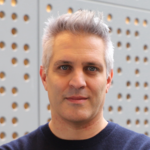Introduction
Hematopoietic stem cells (HSC) provide a lifelong supply of blood and immune cells through their core properties of self-renewal and multilineage engraftment ability. As a result, bone marrow and cord blood transplantation provide a life-saving treatment for blood cancer and other diseases. Our goal is understanding the establishment and maintenance of human HSC properties, as determined by chromatin-mediated gene regulation. We investigate how microenvironment and metabolism influence HSC function, and how to generate or maintain HSCs in vitro while preserving their stemness.
Our Research
Classically used as a lifesaving leukaemia treatment, HSCs also represent a key tool for gene therapy of genetic and other diseases. Yet, practical limitations render these therapies unfeasible or unsuccessful for many patients. To overcome these hurdles, we aim to understand the molecular bases of HSC function and to create a reliable source of HSCs for therapy from pluripotent stem cells (PSCs).
Our Goals
The Blood Stem Cell Identity Lab pursues the following research lines:
Molecular dissection of the self-renewal program in HSC. We explore what transcriptional programs and other regulatory mechanisms define self-renewal ability, and how to preserve them in vitro, to understand the essence of HSC stemness.
Investigation of developmental pathways of functional HSC generation. We use a combination of advanced molecular tools to explore the establishment of a robustly engraftable HSC and the role for the multiple niche environments HSC are exposed to during in utero development.
Development of new strategies for HSC-based therapy. In light of the huge recent advances in the field, we hope to implement our findings to further improve protocols for the generation of HSC-based therapy products that can be introduced in future therapeutic applications.
Establishment and maintenance of self-renewal ability is not only one of the most interesting questions in modern stem cell biology, with clear connections to aging and disease: it also holds the key to immense potential for clinical applications. By using our background in gene regulation and epigenetic modulation in stem cell biology, cancer, and aging, we aim to learn more general lessons regarding stem cells and their future potential in medicine.
Our Challenges
Through our research, we are trying to answer the following questions:
- What are the fundamental mechanisms sustaining self-renewal in HSC?
- How are HSC properties acquired during human development?
- How can we generate and preserve functional human HSC in a dish?
Team
.png?locale=en)
Senior group leader
Scientific Coordinator
Postdoctoral Investigator
Postdoctoral Investigator
Senior Researcher
PhD Student
PhD Student
Research Specialist Technician

Lab Assistant Technician
Lab Assistant Technician
Selected Publications
Current Grants
Wellcome trust
TRANSCRIPTIONAL REGULATION OF SELF-RENEWAL IN HUMAN HAEMATOPOIETIC STEM CELLS
European commission
FUN-HSC Tackling functional maturation for Transplantable hematopoietic stem cell generation

Ministerio de ciencia, innovación y universidades
SpaceHSC-Dev Definición ambiental y espacio-temporal del desarrollo temprano de células madre hematopoyéticas humanas.
Ministerio de ciencia e innovación
EpiBIAS CORRIGIENDO EL DESVIO EPIGENETICO EN CELULAS MADRE ADULTAS DE LA SANGRE EXPANDIDAS EN CULTIVO

Fundación científica de la asociación española contra el cáncer
Dissecting the role of the gene HLF (hepatic leukemia factor) in stemness regulation to identify targeted therapeutic options for AML